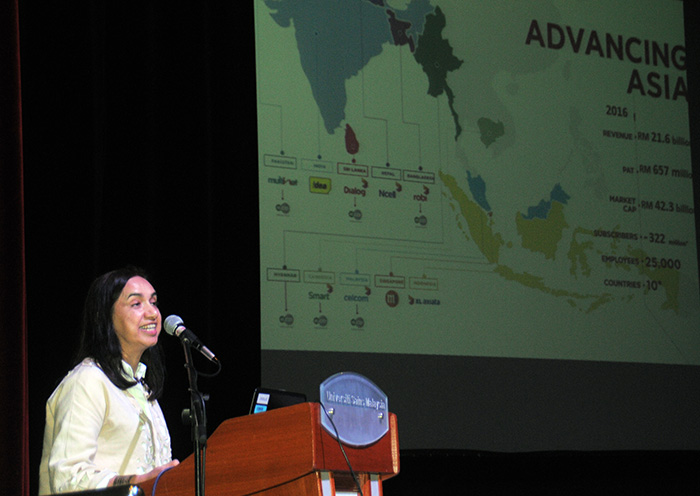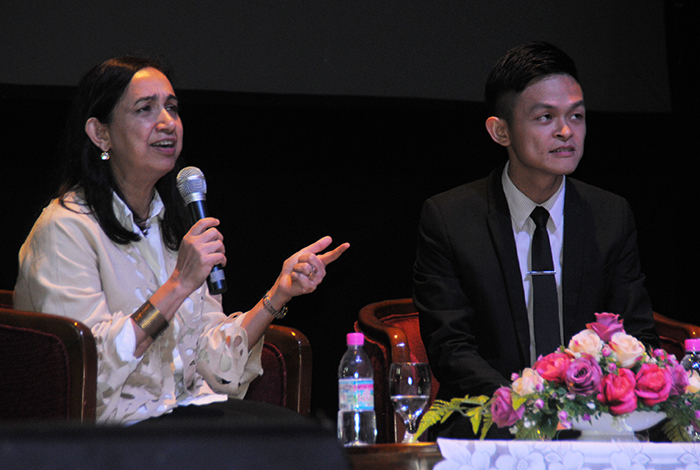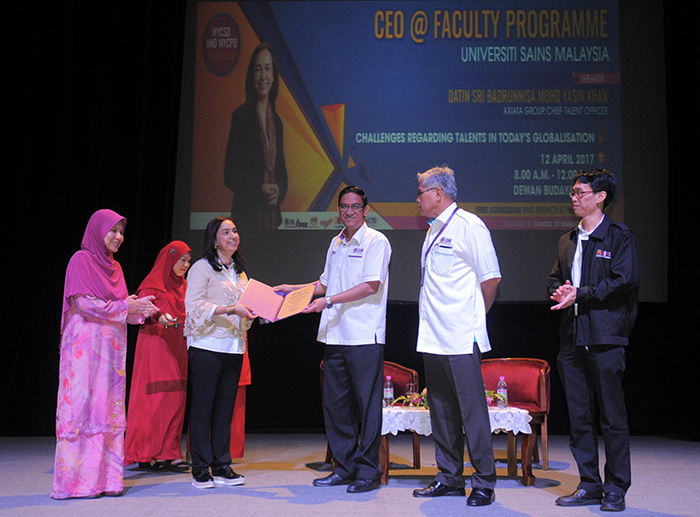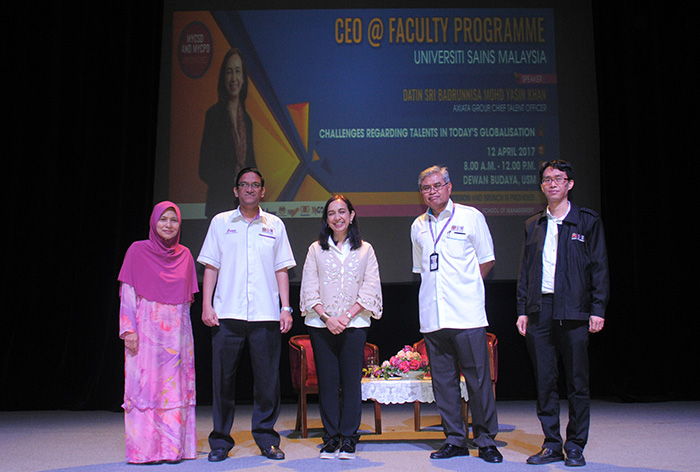IF YOU WANT TO BE A CEO, LEARN TO BE AGILE

Before you dart off to the nearest gym, look for the monkey bars or stretching on the exercise mat, this is not about training yourself to become the next bona fide guy with spider-like agilities.
This is about the agility of the mind.
A person having a high agility to learn would be capable of learning at a faster and more flexible pace.
That was pointed out by Datin Sri Badrunnisa Mohd. Yasin Khan from Axiata during her talk in the CEO@Faculty Programme organised by the School of Management at USM recently. She related some of her experience being in the corporate world for more than 30 years, and currently attached to Axiata as the Group Chief Talent Officer. Axiata is involved in the telecommunications business and has a presence in 10 countries.
She said that the young generation would commonly possess higher learning agility, as they would be able to explore and embrace new ideas, philosophies and principles to learn and understand. Thus, their presence would bring an advantage to the organisations concerned. They would be more open to discoveries, inquiries and experimentations in their daily practices.
Such a view has also been supported by those in the field. “They seek new experiences, enjoy solving complex problems and challenges and perform their work much better due to the new skills that they have incorporated into their repertoire,” as suggested by Hallenbeck, Swisher and Orr in 2011.

Such skills are seen as essential in businesses, whereby a person can study, analyse and understand new situations and problems in a swift and rapid manner. Some have even developed techniques for “fast learning” where they are not afraid to look into a problem, understand and find the most likely means of solving it.
As the world becomes more unpredictable and ever-changing, the young generation, who would be part of the potential future workforce, need to be able to learn and relearn. Learning should in fact, be a lifelong process.
Learning agility is not necessarily an academic skill, but rather it describes a person's ability and passion to quickly study a new problem and use the person’s own learning process to gain deep understanding before making a decision.
At the organisational level, basically it is about acquiring new knowledge and skills, and staying ahead of the market, as stated in the Harvard Business Review.
It is possible for such skills to be developed within oneself, as well as in coaching others. Individuals possessing such skills would be more adept at solving newly-encountered problems and devising new strategies to ensure sustained operations of the organisation.
From Forbes.com, there are pointers on how to cultivate the agile ability to learn, which can be initiated through these five ways, in no particular order:
FIRSTLY, it is always good to innovate and seek for new and different solutions for the problems faced. This would mean exploring the possible approaches to a problem, although ultimately the final choice would be a more practical one.
THEN, identify patterns in complex situations. Most likely there would be examples that would be somewhat similar between what is encountered currently and those encountered previously. Practice being calm and to refine the listening skills, to further understand the situation and to avoid from taking any hurried action.
NEXT, reflect on previous experiences. Further identify inputs or variables that require ‘counterfactual thinking’ – the ‘what-if’ questions. Focus on the problem but seek multiple solutions through inputs from discussions.
ANOTHER STEP to take would be by getting involved in assignments where the probability of success is not guaranteed, thus there is room for improvisation to ‘stretch’ the assignment in ensuring its completion and in fulfilling the requirements.
THE FINAL STEP would be to avoid from being defensive whenever there are failures. More so in relation to ‘stretch’ assignments, as there would be lessons to be learnt from such failures. Admit those mistakes and start to relearn.

Badrunnisa also touched on the adaptive capabilities of organisations in facing the current, ongoing trend of digital disruptions. Such examples mentioned were Uber, Facebook and AirBnB. “Organisations need to continuously learn, relearn and adapt well to be competitive and to stay ahead in the market,” she said.
Try it now. Focus on what you need to know and choose the right methods of learning that would bring you closer towards fulfilling your personal goal as well as those of the organisation that you are working in. Organisations having such individuals would become more competitive resulting from the flexibility and adaptability in dealing with crises and challenges.
USM also acknowledges and is involved in the promotion of lifelong and flexible learning. The process of learning is highly encouraged through various modes and at different levels. This is to allow for the possibility of knowledge-sharing to be experienced in the wider context in society.

The CEO Faculty Programme is one of the programmes under the Malaysian Academic Industry Network (MYAIN) which aims to intensify the participation of the industrial sector as part of the national higher education system through the sharing of experiences and expertise from the industry leaders.
The programme also serves as a platform for cooperation between the university and industry in providing exposure on the industry to the academic staff and students, and also fostering discussion between the industry and the university community.
Text: Mazlan Hanafi Basharudin
- Created on .
- Hits: 1618
